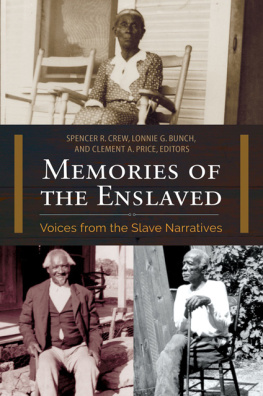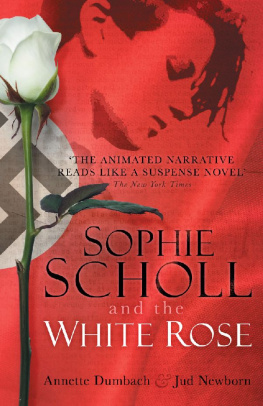Publication of this book is made possible in part by support from the Institute for Scholarship in the Liberal Arts, College of Arts and Letters, University of Notre Dame.
The Omohundro Institute of Early American History and Culture (OI) is sponsored by William & Mary. On November 15, 1996, the OI adopted the present name in honor of a bequest from Malvern H. Omohundro, Jr., and Elizabeth Omohundro
2019 The Omohundro Institute of Early American History and Culture
All rights reserved
Manufactured in the United States of America
Jacket images: Front: Unknown. Deux Antillaises. 18th century. Muse dAquitaine, 2003.4.32, Collection Chatillon. Courtesy of the Muse dAquitaine, Bordeaux. Back: Alexandre de Batz. Sauvages tchaktas matachez en guerriers qui portent des chevelures (detail). Courtesy of the Peabody Museum of Archaeology and Ethnology, Harvard University
Library of Congress Cataloging-in-Publication Data
Names: White, Sophie, author.
Title: Voices of the enslaved : love, labor, and longing in French Louisiana / Sophie White.
Description: Williamsburg, Virginia : Omohundro Institute of Early American History and Culture ; Chapel Hill : University of North Carolina Press, [2019] | Includes bibliographical references and index.
Identifiers: LCCN 2019032062 | ISBN 9781469654041 (cloth) | ISBN 9781469654058 (ebook)
Subjects: LCSH: SlavesLouisianaHistory18th century. | SlaveryLouisianaHistory18th century.
Classification: LCC E445.L8 W47 2019 | DDC 306.3 /620976309033dc23
LC record available at https://lccn.loc.gov/2019032062)
The University of North Carolina Press has been a member of the Green Press Initiative since 2003.
ACKNOWLEDGMENTS
This set of acknowledgments is about my good fortune.
First, my manuscript turned into a book thanks to the Omohundro Institutes visionary Editor of Books, Cathy Kelly, and I wish everyone the bliss of working with someone as brilliant, dynamic, and ever-insightful as she is. It is safe to say that the experience has made us bosom buddies for life. My grateful thanks go also to Chuck Grench, Paul Mapp, Nadine Zimmerli, and to my marvelous and talented copyeditor, Kaylan Stevenson.
This book rests on more than ten years of research. The National Endowment for the Humanities granted me a year-long fellowship in support of this book; they also gave me a fellowship for my first book project, so, truly, I am beyond fortunate. I am not sure how they will feel about my third book project, on red hair. The Gilder Lehrman Center at Yale University offered me a Slavery, Abolition, and Resistance Fellowship at a crucial juncture, and I am enormously privileged to have received every possible kind of support from the University of Notre Dame. I am grateful in particular to the Institute for Scholarship in the Liberal Arts and the Office for Research for the innumerable grants and awards over the years that allowed me to conduct research in the U.S., Canada, France, and the Indian Ocean, to attend conferences, and to acquire forty images for the book.
I have benefited enormously from invitations to present my research over the years and over three continents, yielding precious feedback along the way. At Notre Dame, I am lucky to be a member of a vibrant department where we actively encourage and nurture each others research and teaching endeavors. I am so grateful for the community offered by those units where I am an affiliate: the Departments of Africana Studies and of History (with special thanks to Patrick Griffin) and the Program in Gender Studies.
And then there is Louisiana. We are a hardy and merry band of scholars who work on Louisiana, French America, and race and slavery in early America. It has been a revelation to learn so much from you, only to find that, more than anything, we have forged bonds of friendship. Thank you Guillaume Aubert, Kristen Block, Trevor Burnard, Cline Carayon, Christian Ayne Crouch, Christine Croxall, Shannon Lee Dawdy, Dominique Deslandres, Kathleen DuVal, Robert Englebert, Lin Fisher, Franois Furstenberg, Malick Ghachem, Erin Greenwald, M. Scott Heerman, Eric Hinderaker, Jessica M. Johnson, Sara E. Johnson, Hillary Jones, Jacob F. Lee, Ann M. Little, Karen Marrero, Robert Morrissey, Hayley Negrin, Margaret Newell, Jennifer Palmer, Dominique Rogers, Gordon Sayre, Christina Snyder, Jennifer Spear, Miranda Spieler, Yevan Terren, Danielle Terrazas Williams and very many others (including afficionados of The Dinner). Dan H. Usner, your research has never stopped inspiring and galvanizing me, and I hope that you know how much it has meant to me over the years to have you in my corner. Emily Clark, Alexandre Dub, Jean-Pierre Le Glaunec, Sue Peabody, Brett Rushforth, and Ccile Vidal have a very special place in my world. I want to single out Emily Clark, whose presence permeates this book: she has not only read my manuscript but hosts me in New Orleans, cheers me on at low points, and is unflagging in her mission to make New Orleans real for those of us who have centered our intellectual home therewhich has even included announcing that she was taking me to the Rigolets on Lake Pontchartrain so that I could see for myself the topography and grasp how just apprehensive anyone, let alone two runaways, would feel at the thought of crossing that pass. We have shared, professionally and personally, and I treasure having her in my life.
I am from Mauritius, a former French colony in the Indian Ocean. As the project developed, I turned my attention beyond the French Atlantic and so began a decade-long perambulation among the rich archives of Mauritius. It was also a coming to grips with the horrors of slavery in my beloved island, where I grew up living a charmed life while seeing endless examples of how one persons good fortune often comes at the high cost of anothers misfortunes. My transition to working on an Indian Ocean colony was considerably eased by friends and colleagues who were generous in sharing their expertise, especially Richard Allen, Marina Carter, Graldine Loumeau, Nathan Marvin, Sue Peabody, Geoffrey Summers, and Vijaya Teelock. My special appreciation goes to the staff at the National Archives of Mauritius at Coromandel for their care, under ever-precarious conditions, of a precious repository of documents containing the voices of enslaved persons.
I am also grateful to Jean-Pierre Le Glaunec, Dominique Rogers, and Brett Rushforth for helping to acquaint me with the judicial archives of the French Antilles and Nancy Christie, Dominique Deslandres, and Eric Wenzel for doing the same for the judicial archives of New France.

















